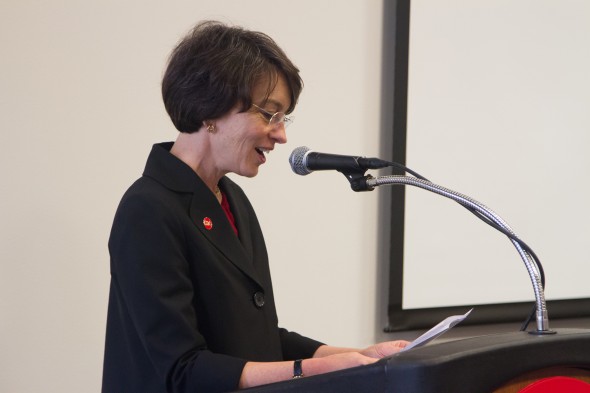Campus Conversation explores hot topics
University leaders launched a conversation series Sept. 14 by exploring ideas that address difficult local and national issues.
Campus Conversation is a yearlong initiative sponsored by the Office of the Provost. The series includes a formal lecture or panel discussion followed a week or two later by an open forum on the same topic. The first lecture, “What’s Going On and Why? The Summer of 2016: Race, Police and Violence,” touched on the social, political, economic and historical contexts and causes of events that occurred over the summer.
“The goal is to have faculty, students and staff engage with each other about some of the big issues of our time that are going on now and affecting all of us,” said Provost and Vice Chancellor for Academic Affairs Susan Poser.
An open forum to futher the discussion takes place from noon to 1 p.m. Wednesday in the Student Center East Cardinal Room.
The panel included experts from different fields: Beth Richie, director of the Institute for Research on Race and Public Policy; Teresa Cordova, director of the Great Cities Institute; Amy Watson, associate professor of social work; and Juliana Stratton, director of the Center for Public Safety and Justice in the College of Urban Planning and Public Affairs.
Barbara Ransby, director of the Social Justice Initiative, moderated the panel.
Richie shared statistics on topics such as the number of people shot in Chicago, but she’s more concerned with “the stories behind those statistics that we’re reading about: the families, the children, the communities that are so disproportionately represented in that violence. I was somewhat relieved …that at least our campus was opening up the opportunity to have this conversation,” she said.
Speakers laid out ideas for people to think about in two parts — one that defined the ongoing problems and another that proposed solutions.
Other topics included in the conversation included violence and its root causes, public policy decisions, trade agreements, fundamental shifts in the economy, mental health and the justice system and methods of restorative justice.
“I really liked all of the speakers’ proposals and what they had to say, because almost all of us usually know what the issues are, but no one knows how to really approach or solve them,” said Ronahy Alzagha, a student in LAS who attended the event. “And that doesn’t mean just jumping to solutions because we need to know the foundations of problems before we can solve them. I really enjoyed this.”
Alzagha is preparing questions for the second part of the series today. “It’s important to come and see what UIC has to say,” she said.
The series will continue throughout the year. In October and November, the focus will shift to the 2016 election and immigration, migration and displacement.

